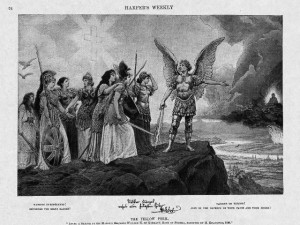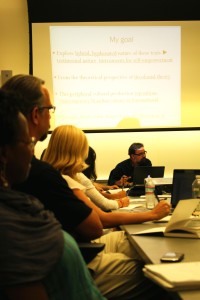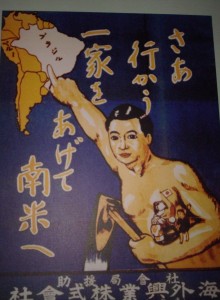by Dorie Perez
Ignacio López-Calvo’s research on literary works of the Japanese immigrant experience in Latin America shows how traditional models of cultural transitivity between mainstream and ethnic minorities are disrupted. The novels he studies reflect changing values in 1970s Brazil and how people remake trajectories of assimilation; this is where his work co-aligns with the Center for the Humanities’ 2013-2015 two-year theme of “The World Upside Down: Topsy Turvy.” The Nikkei community maintained its opposition to cultural assimilation in Brazil, insistent that they were a model to be followed rather than an ethnic minority to be subsumed into the larger dominant culture. This reconfiguring of the classic shift from “yellow peril” to “model minority” is inverted in the Brazilian context.

Image: Harper’s Weekly image depicting Europe’s need to protect the world from “yellow peril.” This was a term attributed to Kaiser Wilhelm, who dreamed of a fiery Buddha threatening the Occident. Source: http://aaww.org/yellow-peril-scapegoating/
López-Calvo places his scholarship in a framework of decolonial theory by selecting two fictional pieces as examples of personal testimony and instruments of empowerment for comparative analysis of larger themes of cultural development and inclusion. Yawara!, Julio Miyazawa’s first novel, examines the immigrant experience as an ongoing search for inclusion that encompasses acts of emplacement, place-making and what makes a person “Brazilian.” The book Uma Rosa para Yumi provided context to a fictionalized account of the Nisei involvement in revolutionary youth activity during the 1970s. These novels offer a truth within fiction, a “new, hybrid Nikkei third space” of cultural celebration, historical memory and claim to place.
Faculty, graduate students, and post-doctoral fellows contributed to a lively discussion focused on the cultural output of Japanese immigration to Brazil that stemmed from issues of belonging, power, and self-identity. Questions were asked about the ways in which this real experience was fictionalized to tell a greater truth that exceeded the bounds of a community seeking to reinforce its model minority status, and whether resistance to cultural fusion came from its own place of hierarchical racialized thinking.


